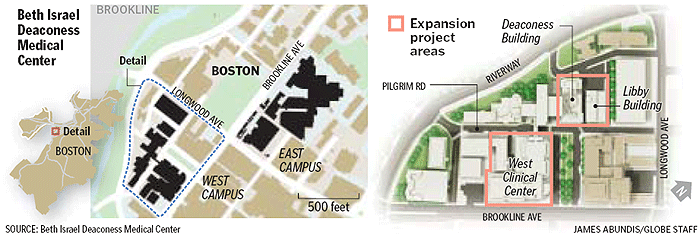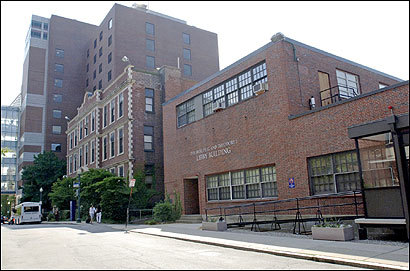Beth Israel plans $1b in growth, upgrades
Raft of proposals reflects increased patient volume, marks dramatic rebound by hospital in past 4 years
By Jeffrey Krasner, Globe Staff | July 27, 2007
Beth Israel Deaconess Medical Center yesterday said it will spend $1 billion over the next 15 years to build a suburban clinic, replace buildings at its cramped Longwood campus, upgrade facilities, and add hospital beds.
The plan reflects the Harvard University teaching hospital's need to handle growing patient volume, update older buildings, and accommodate new technology and improved patient-care standards. It marks a dramatic turnaround from just four years ago, when Beth Israel Deaconess was selling off buildings in the Longwood Medical Area to raise cash.
"This place is growing," said Eric Buehrens, the hospital's chief operating officer. "Volume is up. Our financial performance reflects that patients are coming to us in increasing numbers. When we make projections into the future, we see we need to grow our physical plant."
Inpatient volume has grown modestly over recent years, from 37,221 patients in fiscal year 2002 to 39,023 in fiscal year 2006. "Observation" cases, in which a patient is kept overnight for testing but not formally admitted, increased more rapidly. And clinical treatments of patients who are not admitted grew dramatically from 282,261 in fiscal year 2002 to 451,033 in fiscal year 2006.
Beth Israel Deaconess recently briefed the Boston Redevelopment Authority on its intentions, but said the current plans are only a general outline. Specific building projects are yet to be determined, the hospital said.
"Our goal is to maximize the limited space available on our campus to create a more rational and convenient medical center for our patients," said Paul Levy, the hospital's chief executive, in a statement. "We intend to be a model for how care is organized, both physically and clinically."
"I'm happy to see that Beth Israel is keeping up its commitment to sharing their long-term strategy with the city and studying best practices for smart growth on their campus," said Mayor Thomas M. Menino in a statement.
The first step will likely be a new suburban clinic for patients who don't need to stay overnight. Beth Israel Deaconess has discussed building such a clinic in a joint venture with New England Baptist Hospital. Officials said the location and ownership of the clinic have not been decided. But the clinic will be separate from a planned modest expansion of Beth Israel Deaconess/Needham.
Many of Boston's academic teaching hospitals are moving more services to the suburbs to accommodate patients outside of Boston and reduce congestion at their city campuses.
"All the institutions here have looked at this problem of congestion and have tried to figure out how to handle it responsibly," said Marilyn Swartz-Lloyd, chief executive of the Medical Academic and Scientific Community Organization, a planning group for the Longwood Medical Area.
Buehrens said Beth Israel Deaconess will hire a consultant to create a detailed scheme for the suburban clinic within a year.
Other changes outlined by Beth Israel Deaconess include:
Expansion of the West Clinical Center on Deaconess Road and razing of the Libby and Deaconess buildings on Pilgrim Road to make room for a new tower.
Relocating the maternity department from the East to West campus.
Concentrating outpatient care, administration, and research in the East Campus on Brookline Avenue.
Adding operating rooms, 130 beds, and more capacity for high-tech imaging.
Despite its suburban expansion, Beth Israel Deaconess's plans at its Boston campus will continue to put more pressure on the Longwood Medical Area. Joslin Diabetes Center last week said it has selected a developer to build a massive research tower at the corner of Longwood and Brookline avenues, adjacent to Beth Israel's East Campus.
Swartz-Lloyd said the area employs the equivalent of 40,000 full-time workers and adds about 1,000 full-time jobs a year.
The Beth Israel Deaconess Longwood campuses include about 2.1 million square feet of space. The expansion plan would add about 700,000 square feet for patient care. Separately, the hospital will also be a major tenant in the Center for Life Sciences, a privately developed laboratory building in the Longwood area.
When it was financially strapped a few years ago, Beth Israel Deaconess was shedding real estate. In 2001, it sold 21 Autumn St. to Children's Hospital Boston for $5.4 million. The following year, it sold what was then called the Libby Building to Emmanuel College, for use as a dormitory, for $14.75 million. And in 2003, it sold 1 Autumn St. to Children's Hospital for $28 million.
Those sales make the medical center's expansion plans more important and tougher to execute because it has fewer options on its own land.
Jeffrey Krasner can be reached at
krasner@globe.com.




















